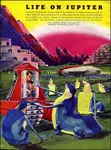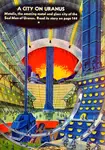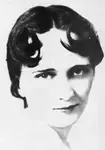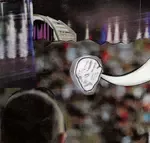- Home
- >
religion in the old solar system
Since Truth is one, ideally no partitions should exist between systems of thought - should they? And we sf fans are naturally big thinkers - aren't we? So an sf website which focuses on the Old Solar System is not an inappropriate place to explore the reconciliation between science and religion - especially as the great religious writer C S Lewis wrote OSS fiction and respected science.
not yet ready to merge
Stid: But we do have to keep up the barriers.
Zendexor: I know, I know. Lewis himself agreed they were necessary to some degree, in our fallen world. He wrote of the distinction between myth and reality being meaningless "beyond the Moon" - a way of saying, "ultimately". But here, for the time being, Man is not ready, in intellect or character, to merge the categories. Even to blur their common boundary is to take a risk. The wall needs to be maintained - as a safety measure.
Rupert Sheldrake did well to put his case of "morphic resonance" as pure science...
Stid: It didn't do him any good.
Zendexor: Of course his idea was rejected by the scientific community, who have categorized morphic resonance as pseudoscience... but my point is, he knew when presenting it that his aim had to be to justify it as science. Indeed he classes himself as a scientist.
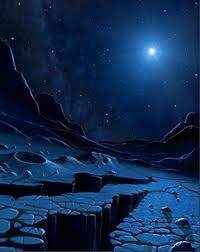
But the day may come, some time before the Sun becomes a white dwarf or the Milky Way merges with M31, when a different kind of language becomes acceptable.
Harlei: Here, listen to this - from long way beyond that time: it's about the hand-weapon known as the Diskos.
And I turned me then away, and went off into the night, going swift and cautious, and bearing the Diskos cunningly and almost, as it were, with a love for that strange and wondrous weapon that had so befriended me, and slain the foul Grey Man with one stroke. And I had the feeling that it did know me, and had a comradeship for me; and I doubt none will understand this; save, it might be, they of the olden days that did carry one strong sword always. Yet was the Diskos more than the sword; for it did in truth seem to live with the fire and the flame of the Earth-Current that did beat within it.
And it was well acknowledged within the Great Redoubt, that none might touch the Diskos of an other; for that the thing went crustily, as it might be said, in the hands of a stranger...
You see? Spiritual affinity between user and tool -
Zendexor: Quite! As with the Lens in the Lensman books -
Harlei: - and this affinity was - note the words - well acknowledged by the super-scientific folk of the Great Redoubt in that far future age of the world, as described in The Night Land. No clash of principle. Open acknowledgement of a spiritual fact without the need to reduce it to the language of force-fields or whatever... the folk of the Great Redoubt have gone beyond our limited categorizations.
Zendexor: Well, you see, by that time humanity had discovered to its cost that mucking around with other dimensions of reality can have consequences of spiritual evil. The Doorways in the Night... and so on. That the tinkerings had been "scientific" did nothing to stop what came through the door.
The lesson was learned - rather late...
Stid: You're thinking that there's not much point trying to teach it now. Wait a few million years - that's your recommendation.
Zendexor: Yes, and in the meantime we make do with the compartments. Science. Philosophy. Religion. The soup of reality packaged in separate cans. Safer that way, even if false.
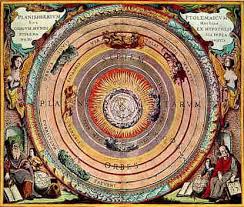
the dark eldils
Mind you, I admire C S Lewis' effort to graft the unifying spirit of medieval cosmology onto science fiction in his Cosmic Trilogy. In that work the angelic Intelligences - themselves inheritors of some attributes of the mythic gods - become the guiding Archons of Malacandra (Mars) and Perelandra (Venus). The Intelligence of Earth is interpreted as the one that went wrong, way back before life evolved on our planet. He of course is easily identifiable as Lucifer/Satan, though never named as such in the trilogy where he is referred to as the "bent" archon of Thulcandra, the Silent Planet - the cut-off, besieged planet.
And some of the lesser incorporeal beings - not the planetary Intelligences but like them, energy-beings or "angels" and called "eldils" - took the part of the "bent" archon and became what we call devils.
But (here comes a shivery science-fictional thrill in volume three) we first hear these devils mentioned in the language of science - in dialogue between Professor Frost of the sinister National Institute for Co-Ordinated Experiments, and the prisoner, Mark Studdock.
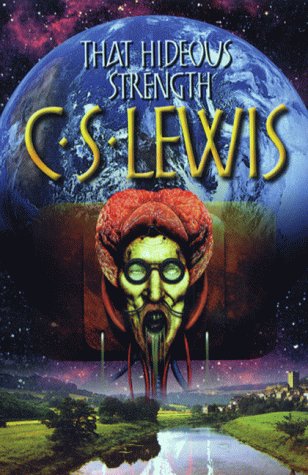
"...And now, please, attend very carefully. You have probably not heard of macrobes."
"Microbes?" said Mark in bewilderment. "But of course - "
"I did not say microbes, I said macrobes. The formation of the word explains itself. Below the level of animal life we have long known that there are microscopic organisms. Their actual results on human life, in respect of health and disease, have, of course, made up a large part of history: the secret cause was not known till we invented the microscope."
"Go on," said Mark. Ravenous curiosity was moving like a sort of ground-swell beneath his conscious determination to stand on guard.
"I have now to inform you that there are similar organisms above the level of human life. When I say "above" I am not speaking biologically. The structure of the macrobe, so far as we know it, is of extreme simplicity. When I say that it is above the animal level, I mean that it is more permanent, disposes of more energy, and has greater intelligence."
"More intelligent than the highest anthropoids?" said Mark. "It must be pretty nearly human, then."
"You have misunderstood me. When I said it transcended the animals, I was, of course, including the most efficient animal, Man. The macrobe is more intelligent than man."
"But how is it in that case that we have had no communication with them?"
"It is not certain that we have not. But in primitive times it was spasmodic, and was opposed by numerous prejudices. Moreover the intellectual development of man had not reached the level at which intercourse with our species could offer any attraction to a macrobe. But though there has been little intercourse, there has been profound influence. Their effect on human history has been far greater than that of the microbes, though, of course, equally unrecognised. In the light of what we now know all history will have to be rewritten. The real causes of all the principal events are quite unknown to the historians; that, indeed, is why history has not yet succeeded in becoming a science."
"I think I'll sit down, if you don't mind," said Mark...
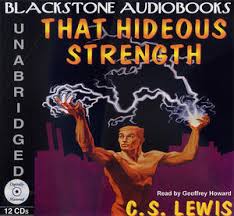
It's
all a magnificent exercise in myth-adaptation. A
diversion of many old streams into a fresh canal of thought. (And a key point of discussion for any boundary-definition debate on the theme of fantasy versus science fiction.)
Dr Ransom, the hero of the first two volumes in the trilogy, gathers to himself a small following after his return to Earth - a select Company, to keep watch on the National Institute for Co-Ordinated Experiments and, if possible, oppose its Nazi-like power - a power termed in the book's title, That Hideous Strength.
A junction of evils becomes apparent when the Company come to realize
...that the N.I.C.E., at its core, was not concerned solely with modern or materialistic forms of power. It told the Director, in fact, that there was Eldilic energy and Eldilic knowledge behind it. It was, of course, another question whether its human members knew of the dark powers who were their real organisers. And in the long run this question was not perhaps important. As Ransom himself had said more than once, "Whether they know it or whether they don't, much the same sort of things are going to happen..."
...There was now at last a real chance for fallen Man to shake off that limitation of his powers which mercy had imposed upon him as a protection from the full results of his fall. If this succeeded, hell would be at last incarnate. Bad men, while still in the body, still crawling on this little globe, would enter that state which, heretofore, they had entered only after death, would have the diuturnity and power of evil spirits. Nature, all over the globe of Tellus, would become their slave: and of that dominion no end, before the end of time itself, could be certainly foreseen.
Lewis' imaginative achievement in this trilogy spurts off further links in all directions. To name but a few: the Martian sages, refraining from space travel, have echoes in Red Planet and No Man Friday; the "teleological evolution" of the Perelandrians into human form has faint echoes in the "morphic resonance" idea discussed above or even the Uranians' convergent evolution in Uranian Gleams - the latter also with a "World Spirit", the entity named "Thremdu"...
Stid: Whoa, Zendexor. You're going too far. The links you are trying to forge - the ones involving Perelandra at any rate - are too thin to hold. Next thing you'll be paralleling the Uranian World Spirit with the Archons in Lewis' work. Really, it's nothing to do with it. And the reason you're going so far, is that you very much want to link Lewis' trilogy with other tales. You don't like to admit how much it stands alone.
the worship of tur
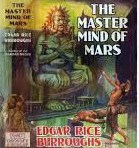 In the temple of Tur
In the temple of TurZendexor: A fair cop. I stand corrected. Perhaps we ought to be having a different sort of discussion about OSS religion. Not so serious. Instead, a colourful prop. Like the worship of Tur, the god whose cult dominates the city of Phundahl, one of the backward cities of Barsoom, described in The Master Mind of Mars.
Stid: It's a fun episode, you must admit. The way the priests of Tur so determinedly ignore the heaps of evidence that contradicts their sacred text, Turgan...
Turgan taught them that Barsoom is flat and they shut their minds to every proof to the contrary. They would not leave Phundahl far for fear of falling off the edge of the world; they would not permit the development of aeronautics because should one of their ships circumnavigate Barsoom it would be a wicked sacrilege in the eyes of Tur who made Barsoom flat.
They would not permit the use of telescopes, for Tur taught them that there was no other world than Barsoom and to look at another would be heresy; nor would they permit the teaching in their schools of any history of Barsoom that antedated the creation of Barsoom by Tur...
Zendexor: You get the idea. As it happens, deception in the temple of Tur helps the plot to rollick along. But intellectually this "religion" is sheer farce. Not that one expects deep discussion of such matters in a Barsoom novel, but still -
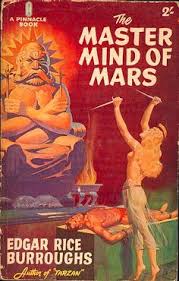
Stid: But you don't like the satire, that's it isn't it? You don't like religion being laughed at, but I say it deserves to be laughed at when it ignores evidence. And we live in an age where people could do to be reminded that science has the honesty to follow the evidence wherever it leads...
Zendexor: Follow it in a circle, you mean.
Science claims to proceed "according to the evidence". But what is admissable as evidence? Those observations which meet certain criteria. What criteria? Scientific criteria... So round and round we go. How do we decide what are scientific criteria? Yes, you got it - we decide scientifically!!
Between this sort of stuff and the liturgies of Tur, frankly, the choice is moot...
Stid: Are you serious? Comparing the scientific method with the bigots of Tur?
Zendexor: All ultimately swallowing their own tails, as it were - yes, all of them governed, as I said, by a personal choice of criteria, which then determines what they allow to be real. The universe leaves us to define "evidence" in our own way. Nothing is forced upon us.
Harlei: How would you break out of the circle, Zendexor?
Zendexor: I doubt if it's humanly possible.
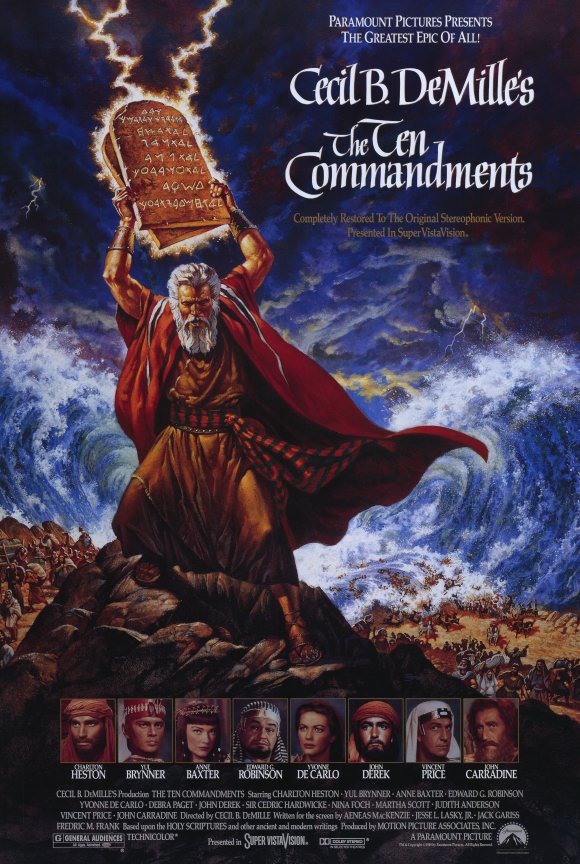
You know, it's occurred to me, paradoxically, that the only chance for a real objective science would be one based upon a religious revelation.
I mean to say, if we could bring down some tablets of stone from Mount Sinai, on which God had engraved His laws of scientific method, we could then take them seriously, because they weren't just invented by people.
Stid: But failing that...
Zendexor: We're going round in same old the circle. Assumptions affect conclusions which reinforce the assumptions which reinforce the conclusions -
Nevertheless I feel one ought at least to enlarge the circle. Allow the qualitative aspect of reality some parity with the physical. In other words, be religious, whether or not the religion has a God in it.
Stid: There is the little problem of consensus...
Zendexor: That's a procedural thing. A practical matter, of keeping science going as a group enterprise. But it has no epistemological value. Whatever the truth is, it certainly doesn't depend upon us agreeing about it.
Stid: But practical success in a line of study is apt to increase one's confidence in the quality of the thought behind it...
martian wisdom, krothan progress
Zendexor: We come back to Martians again. This time to the amazing creatures in No Man Friday, and the reflections they arouse in Gordon Holder, the technical-minded Earthman who was stranded among them.
Holder discusses the Martians with DeLut, one of his eventual rescuers from Earth. Holder still believes that Man will eventually expand throughout the universe, technocratically triumphant -
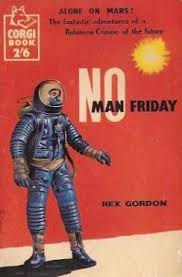
"Only it will be only sometimes, in quiet corners, out of the main stream, in places where hope is no longer possible and when action has become futile and been seen to be futile for generations at a time..."
We looked down on Mars and became conscious that she was receding from us....
"Then?" DeLut said. "In backwaters, in places where conditions are like those on Mars, where competition does not exist, and the spirit can live in a material desert sufficient only to the body's needs?"
"Then," I said. I watched the stars begin to move and turn... "Then," I said, "the other thing will be born. That knowledge that is of being, not of doing. Those inferences which are of actualities, not events. Those permanencies which come of a losing of the sense of time: when a moment is eternity, and eternity is a moment, and all ages are embodied in an instant. Perhaps then, for some of us, sometime, the work of our active lives, which consists of no more than moving matter around in space, will be seen to be the futility that it is, and our preconceptions about structure and dimensions will disappear... leaving something else."
Stid: The "something else" being religion, I take it.
Zendexor: Call it what you like. An improved awareness at any rate. Note how in The Rise, the depiction of Kroth, that simplistic "ground state" of Earth, shows us a society with fuzzy science and fuzzy religion, both equally primitive and vague; scientific laws work only intermittently and as for religion, the recital of the Creed goes like this:
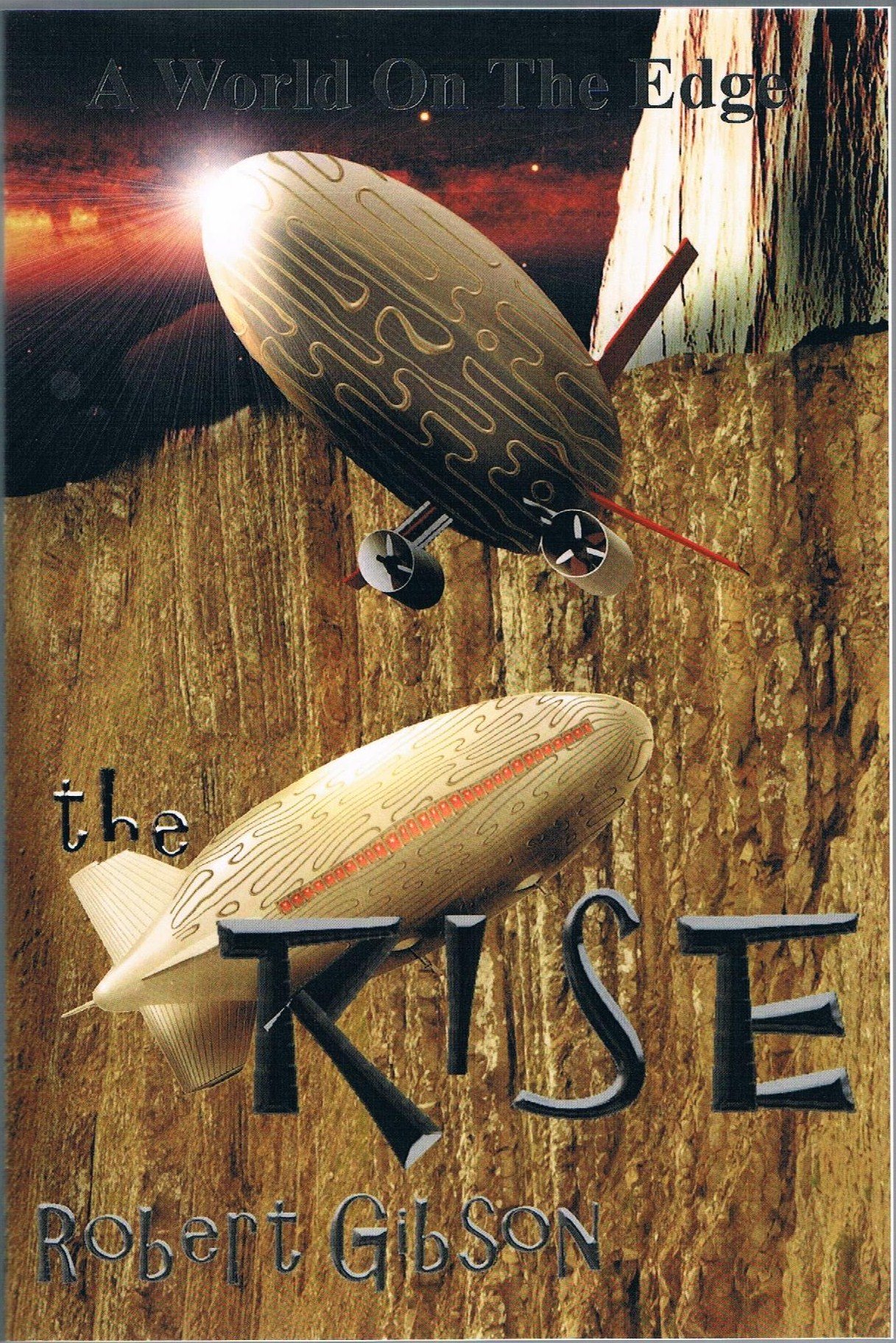
"...We believe in the qualitative dimension,
The primacy of Personality as the Ground of one's Being,
The demiurgic Logos,
The spiritual unity of all life,
The aspirational convergence of positive energies
And the eternal transcendence of every brief pattern in the temporal flow.
Amen."
Stid: Sounds all right to me.
Zendexor: But not very focused. And neither was the science of Kroth - until the great fleet went North and the Polar Parliament dared some crisp enactments and, finally, The Rise succeeds... Science and religion advance together.
Harlei: Becoming crisper, you say? Perhaps advancing towards a firmer awareness than what most people call "faith"? That was Simak's thing. In the City saga, for instance.
Using the relativity-defying technology of the 22nd century, which allows instant communication between Earth and Mars, Jerome A Webster, M.D. (author of Martian Physiology, with Special Reference to the Brain), sitting in his Wisconsin study, receives a momentous call from his Martian friend Juwain:
A voice said almost at his shoulder: "May I come in?"
A soft, sibilant voice, wholly unhuman. But one that Webster knew.
He turned slightly and saw the elaborate crouching pedestal, the furry, soft-eyed figure of the Martian squatting on it. Other alien furniture loomed indistinctly beyond the pedestal, half guessed furniture from that dwelling out on Mars...

"Your book," declared Juwain, "has put Mars in debt to you. It may focus more attention on Martian specialization. My people do not make good doctors. They have no background for it. Queer how the minds of races run. Queer that Mars never thought of medicine - literally never thought of it. Supplied the need with a cult of fatalism. While even in your early history, when men still lived in caves - "
"There are many things," said Webster, "that you thought of and we didn't. Things we wonder now how we ever missed. Abilities that you developed and we do not have. Take your own specialty, philosophy. But different than ours. A science, while ours never was more than ordered fumbling. Yours an orderly, logical development of philosophy, workable, practical, applicable, an actual tool."
Juwain started to speak, hesitated, then went ahead. "I am near to something, something that may be new and startling. Something that will be a tool for you humans as well as for the Martians. I've worked on it for years, starting with certain mental concepts that first were suggested to me with arrival of the Earthmen. I have said nothing, for I could not be sure."
"And now," suggested Webster, "you are sure."
"Not quite," said Juwain. "Not positive. But almost."
It's a thread that runs through Simak's stories. He may call it a philosophy but really it's a qualitative thing, a religion, with the key additional feature of communicability, of demonstrability, of consensual certainty.
Stid: But Jerome Webster goes and blows it...
Harlei: Not permanently...
Zendexor: Be that as it may, we can characterize the Simak stance as retaining one important aspect of Christianity - namely, that each individual soul is of infinite worth. Simak may think that faith is not enough and that you need something demonstrable, but like the Christians he's into mercy and compassion for all beings, as he emphasizes in Time And Again.
god the experimenter
We could end the page on Simak's humane note. Or on the other hand we could end with the chilly, though beautifully expressed, contemplative fatalism of Olaf Stapledon... spoken through the mouth of one of the Last Men, an inhabitant of Neptune 2,000,000,000 years hence:
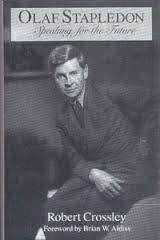
...if ever the cosmic ideal should be realized, even though for a moment only, then in that time the awakened Soul of All will embrace within itself all spirits whatever throughout the whole of time's wide circuit. And so to each one of them, even to the least, it will seem that he has awakened and discovered himself to be the Soul of All, knowing all things and rejoicing in all things. And though afterwards, through the inevitable decay of the stars, this most glorious vision must be lost, suddenly or in the long-drawn-out defeat of life, yet would the awakened Soul of All have eternal being, and in it each martyred spirit would have beatitude eternally, though unknown to itself in its own temporal mode.
It may be that this is the case. If not, then eternally the martyred spirits are martyred only, and not blest.
We cannot tell which of these possibilities is fact. As individuals we earnestly desire that the eternal being of things may include this supreme awakening. This, nothing less than this, has been the remote but ever-present goal of our practical religious life and of our social policy.
In our racial mode we have also greatly desired this end, but differently.
Even as individuals, all our desires are tempered by that relentless admiration of fate which we recognize as the spirit's highest achievement. Even as individuals, we exult in the issue whether our enterprises succeed or fail. The pioneer defeated, the lover bereaved and overwhelmed, can find in his disaster the supreme experience, the dispassionate ecstasy which salutes the Real as it is and would not change one jot of it. Even as individuals, we can regard the impending extinction of mankind as a thing superb though tragic. Strong in the knowledge that the human spirit has already inscribed the cosmos with indestructible beauty, and that inevitably, whether sooner or later, man's career must end, we face this too sudden end with laughter in our hearts, and peace.
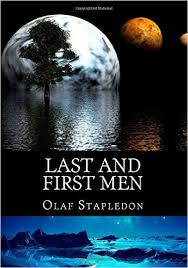
But there is one thought by which, in our individual state, we are still dismayed, namely that the cosmic enterprise itself may fail; that the full potentiality of the Real may never find expression; that never, in any stage of time, the multitudinous and conflicting existents should be organized as the universal harmonious living body; that the spirit's eternal nature, therefore, should be discordant, miserably tranced; that the indestructible beauties of this our sphere of space and time should remain imperfect, and remain, too, not adequately worshipped.
But in the racial mind this ultimate dread has no place. On those few occasions when we have awakened racially, we have come to regard with piety even the possibility of cosmical defeat. For as the racial mind, though in a manner we earnestly desired the fulfilment of the cosmical ideal, yet we were no more enslaved to this desire than, as individuals, we are enslaved to our private desires. For though the racial mind wills this supreme achievement, yet in the same act it holds itself aloof from it, and from all desire, and all emotion, save the ecstasy which admires the real as it is, and accepts its dark-bright form with joy. [Last And First Men, p.309-11]
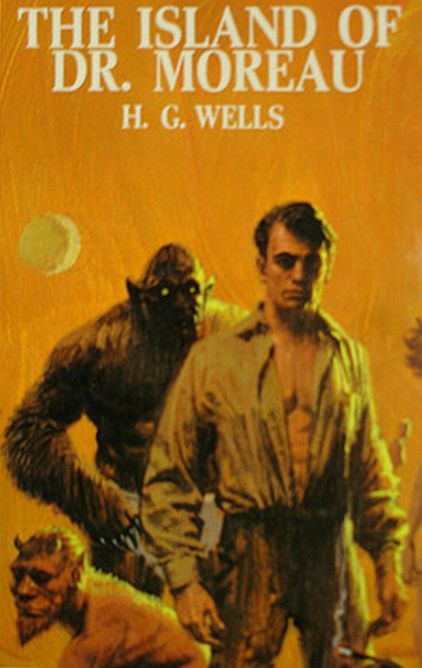
Stid: You call that "chilly"? I call it inspiring.
Zendexor: Both, maybe. But if you go way outside the Solar System and consider the book's sequel, Star Maker, you can understand why C S Lewis complained that it "ends in devil-worship". A strong way of putting it; but Stapledon's God certainly does put experimentation before compassion - he seems rather akin to the vivisecting God whom Wells targets metaphorically in The Island of Dr Moreau.
Edgar Rice Burroughs, The Master Mind of Mars (1927); Robert Gibson, The Rise (2015); Uranian Gleams (2015); Rex Gordon, No Man Friday (1956); William Hope Hodgson, The Night Land (1912); C S Lewis, the Cosmic Trilogy: Out of the Silent Planet (1938); Perelandra (1944); That Hideous Strength (1945); Clifford D Simak, City (1952); Time and Again (1951); Olaf Stapledon, Last And First Men (1930); Star Maker (1937); H G Wells, The Island of Dr Moreau (1896)
For a look at Lewis' satirical attack on the "evolutionary imperiative", see the page on moral dimensions.



